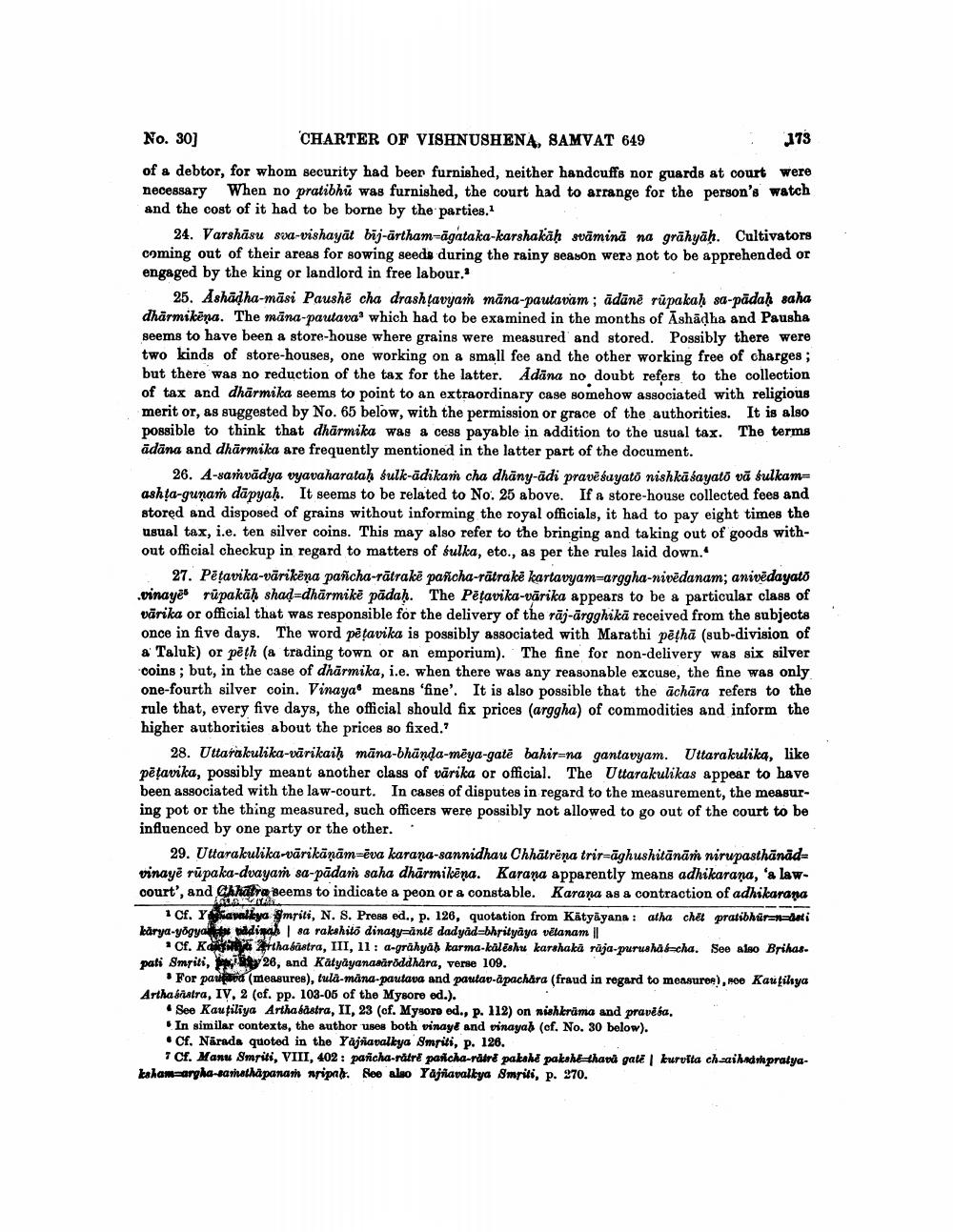________________
No. 30]
CHARTER OF VISHNUSHENA. SAMVAT 649
:
173
of a debtor, for whom security had beer furnished, neither handcuffs nor guards at court were necessary When no pratibhu was furnished, the court had to arrange for the person's watch and the cost of it had to be borne by the parties.
24. Varshāsu sva-vishayāt bij-artham-agataka-karshakah sväminä na grāhyāḥ. Cultivators coming out of their areas for sowing seeds during the rainy season wera not to be apprehended or engaged by the king or landlord in free labour.'
25. Ashādha-māsi Paushề cha drashavyan māna-pautavam ; ādänë rūpakah sa-pādah saha dharmikëna. The māna-pautava' which had to be examined in the months of Ashādha and Pausha seems to have been a store-house where grains were measured and stored. Possibly there were two kinds of store-houses, one working on a small fee and the other working free of charges; but there was no reduction of the tax for the latter. Adāna no doubt refers to the collection of tax and dhārmika seems to point to an extraordinary case somehow associated with religious merit or, as suggested by No. 65 below, with the permission or grace of the authorities. It is also possible to think that dharmika was a cess payable in addition to the usual tax. The terms ādāna and dhārmika are frequently mentioned in the latter part of the document.
26. A-sarvādya vyavaharataḥ śulk-adikaṁ cha dhāny-ādi pravē buyato nishkā šayato vă sulkamashta-gunam dāpyah. It seems to be related to No. 25 above. If a store-house collected fees and stored and disposed of grains without informing the royal officials, it had to pay eight times the usual tax, i.e. ten silver coins. This may also refer to the bringing and taking out of goods without official checkup in regard to matters of bulka, etc., as per the rules laid down."
27. Pēļavika-vārikēna pañcha-rātrakē pañcha-rātrakë kartavyam-arggha-nivēdanam; anivēdayato vinayēs rūpakāh shad=dhārmikë pādah. The Pēļavika-vārika appears to be a particular class of vārika or official that was responsible for the delivery of the räj-ärgghikä received from the subjects once in five days. The word pēțavika is possibly associated with Marathi pētha (sub-division of a Taluk) or peth (a trading town or an emporium). The fine for non-delivery was six silver coins; but, in the case of dharmika, i.e. when there was any reasonable excuse, the fine was only one-fourth silver coin. Vinaya means 'fine'. It is also possible that the achāra refers to the rule that, every five days, the official should fix prices (arggha) of commodities and inform the higher authorities about the prices so fixed.?
28. Uttarakulika-värikaih māna-bhända-mēya-gate bahirana gantavyam. Uttarakulika, like pētavika, possibly meant another class of vārika or official. The Uttarakulikas appear to have been associated with the law-court. In cases of disputes in regard to the measurement, the measuring pot or the thing measured, such officers were possibly not allowed to go out of the court to be influenced by one party or the other..
29. Uttarakulika-vārikāņām=ēva karana-sannidhau Chhātrēna trir=āghushitānāṁ nirupasthānād= vinayê rūpaka-dvayan sa pādar saha dhārmikēna. Karana apparently means adhikarana, '& law. court', and Chhatra Beems to indicate a peon or a constable. Karana as a contraction of adhikarana
1 Cf. Yskavalkya Amriti, N. S. Press ed., p. 126, quotation from Kätyāyana : atha chet pratibhüredeti karya-yogya padinah na rakshito dinasyante dadyåd=thrityaya vēlanam ||
Of. Ka t thafastra, III, 11 : a-grähyah karma-kälēshri karshakà räja-purushalacha. See also Brihas. pati Smriti, 26, and Katyāyanakäröddhāra, verse 109.
• For paura (measures), tula-mana-pautava and pautao-apachara (fraud in regard to measuren), 100 Kautilya Artha bratra, IV. 2 (cf. pp. 103-05 of the Mysore ed.).
• See Kaufiliya Artha datra, II, 23 (cf. Mysore ed., p. 112) on nishkrūma and pravda.
In similar contexts, the author uses both vinayć and vinayad (of. No. 30 below). • Cf, Närada quoted in the Yajšiavalleya Smriti, p. 126.
7 Cf. Manu Smriti, VIII, 402: pancha-ntre parcha-nädre paksha pakshethaud gale kurulta ch-aihdrpratyakaham-argha-samathapanan ariprik. See also Yajšiavalkya Smriti, p. 970.




